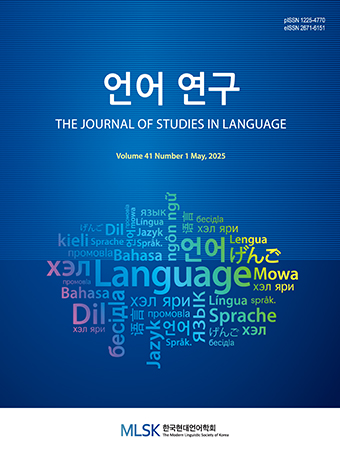Research Article
Abstract
References
Information
Considering the relationship between language and social media, the present study analyzed the languages used by the US President Donald Trump and the former President Barack Obama on their respective Twitter accounts from 2017 to 2019. The study examined the patterns of language and the messages based on pragmatic theories. A total of 10,542 tweets were finalized as valid data. The results show that the most frequently used words were great, people in the case of Trump and people, world were the words used by Obama. In the 4-word phrases analysis, the fake news media was the most used phrase by Trump and Michelle and I appeared most in Obama’s messages. In the pragmatic analysis, the most retweeted messages of Trump and Obama in each year were analyzed based on presupposition and implicature. This study demonstrated that Twitter messages by influential politicians are important due to their impact. Therefore, understanding not only the literal meaning but also the implied meaning is crucial.
- 곽면선. 2018. SNS 커뮤니케이션에서 영어와 한국어에 나타난 세대 간 언어의 격차 분석: 화용론적 관점에서. 『언어연구』 35.2, 161-183. 10.18627/jslg.35.2.201908.161
- 박창문, 조재욱. 2013. SNS의 정치적 동원기능에 관한 비판적 고찰: 18대 대선에서 트위터를 중심으로. 『한국정당학회』 12.2, 187-220.
- 변길자. 2017. 한국어와 영어문자메시지 유형 비교 및 분석. 『언어학연구』 22.2, 71-95. 10.21291/jkals.2017.22.2.5
- 설진아. 2012. 이집트 민주화혁명에서 SNS와 소셜 저널리즘: 페이스북의 사례를 중심으로. 『한국언론정보학보』 58, 7-30.
- 이상록, 이지연, 성경. 2012. 트위터 안의 정치 담론에 나타난 매개 유력자 분석: 2012 년 411 총선 주요 이슈를 중심으로. 『미디어 경제와 문화』 10.4, 7-38.
- 이정복. 2012. 스마트폰 시대의 통신 언어 특징과 연구 과제. 『사회언어학』 20.1, 177-211.
- 이진성. 2013. 영어 통신언어의 표기 특성과 한국어 통신언어와의 의사소통 전략의 차이. 『사회언어학』 21.3, 221-247.
- 조성은, 박한우. 2011. 트위터를 통해 본 대권 주자들의 소통유형. 『인터넷 소셜 미디어 개론』, 128-163.
- 한혜령. 2011. 맥락과 의미: 함축과 전제, 『영어교육을 위한 화용론』 이재희 외, 서울: 한국문화사.
- 홍삼열, 오재철. 2010. 트위터와 페이스북 사용자 접속요인 비교분석. 『인터넷 정보학회 추계학술대회 논문집』.
- 홍주현, 이창현. 2012. 트위터에서 형성된 정치적 의견 분석을 통한 분화된 공중연구: 10 ․ 26 서울시장 재보궐 선거를 중심으로. 『한국언론정보학보』 59, 138-161.
- Anderson, B. 2017. Tweet-in-Chief: A Content Analysis of President Trump’s Tweeting Habits. Elon Journal of Undergraduate Research in Communications 8.2, 36-47.
- Burgoon, J. K. 1985. Nonverbal signals. handbook of International Communication (ed), Thousand Oaks, CA:Sage, 344-390.
- Crystal, D. 2008. Txting: The Gr8 Db8. Cambridge: Cambridge University Press.
- Deighton, J. and L. Kornfeld. 2008. Obama versus Clinton: The Youtube Primary. Harvard Business School: Boston, Massachusetts.
- Enli, G. 2017. Twitter as arena for the authentic outsider: exploring the social media campaigns of Trump and Clinton in the 2016 US presidential election. European Journal of Communication 32.1, 50-61. 10.1177/0267323116682802
- Hindman, M. S. 2009. The myth of digital democracy. Princeton. NJ: Princeton University Press. 10.1515/9781400837496
- Hong, S. and D. Nadler. 2012. Which candidates do the public discuss online in an election campaign?: The ues of social media by 2012 presidential candidates and its impact on candidate salience. Government Information Quaterly 29, 455-561. 10.1016/j.giq.2012.06.004
- Liu, C. 2016. Reviewing the Rhetoric of Donald Trump’s Twitter of the 2016 Presidential Election. Master thesis, Sweden: Jököing University.
- Ross, A. S. and D. J. Rivers. 2018. Discursive Deflection: Accusation of “Fake news” and the Spread of Mis- and Disinformation in the Tweets of President Trump. Social Media + Society 4.2, 1-12. 10.1177/2056305118776010
- Sajjad, F., M. Malghnai, and D. Khosa. 2018. Language Social Media and Political Identity (Re)presentation: A New Theoretical Framework for the Analysis of Social Media Political Discourse. International Journal of English Linguistics 4.2, 199-206. 10.5539/ijel.v8n2p199
- Wills, D. and S. Reeves. 2009. Facebook as political weapon: Information in social networks. British Politics 4.2, 265-281. 10.1057/bp.2009.3
- 언론중재위원회. 2018. 09. 21. 트위터로 정치하다: 트위플로머시(Twiplomacy). SNS 기자단. Web.
- BBC News. 19 May. 2019. “When spelling goes wrong: Famous typos from Trump to Nasa”.
- Lakoff, G. 3 Jan. 2018. “A taxonomy of Trump tweets.”, twitter.com@Georglaoff.
- NBC News. 19 Jan. 2017. “Murray, M. Analysis: Contrast Between Obama and Trump is ‘Unprecedented’”.
- Simms, K. 19 Jan. 2018. “One year of Trump: Linguistics expert analyses US President’s influence on language”, University of Liverpool News.
- Tauberg, M. 2018. “Analyzing Trump’s Tweets. A Data-Based Analysis of Trump’s Language on Twitter”. The Startup.
- The New York Times. 2 Nov. 2019. Shear, M. D., Haberman, M., Confessore, N., Yourish, K, Buchanan, L, and Collins, K. “How Trump Reshaped the Presidency in Over 11,000 Tweets”.
- The Root. Harriot, M. 8 Aug. 2018. “Donald Trump’s Tweets About Black People, By the Numbers”.
- The Washington Post. 3 Jul. 2017. Bump, P. “Resolved: Barack Obama is better at Twitter than Donald Trump”.
- Trump Twitter Archive. trumptwitterarchive.com.
- Twitonomy. twitonomy.com.
- Twitter.com: @realDonaldTrump, @BarackObama.
- Windels. J. 29 May. 2013. “Research Shows Twitter is Driving English Language Evolution”. Brandwatch.com.
- Publisher :The Modern Linguistic Society of Korea
- Publisher(Ko) :한국현대언어학회
- Journal Title :The Journal of Studies in Language
- Journal Title(Ko) :언어연구
- Volume : 36
- No :2
- Pages :143-161
- DOI :https://doi.org/10.18627/jslg.36.2.202008.143




 The Journal of Studies in Language
The Journal of Studies in Language






